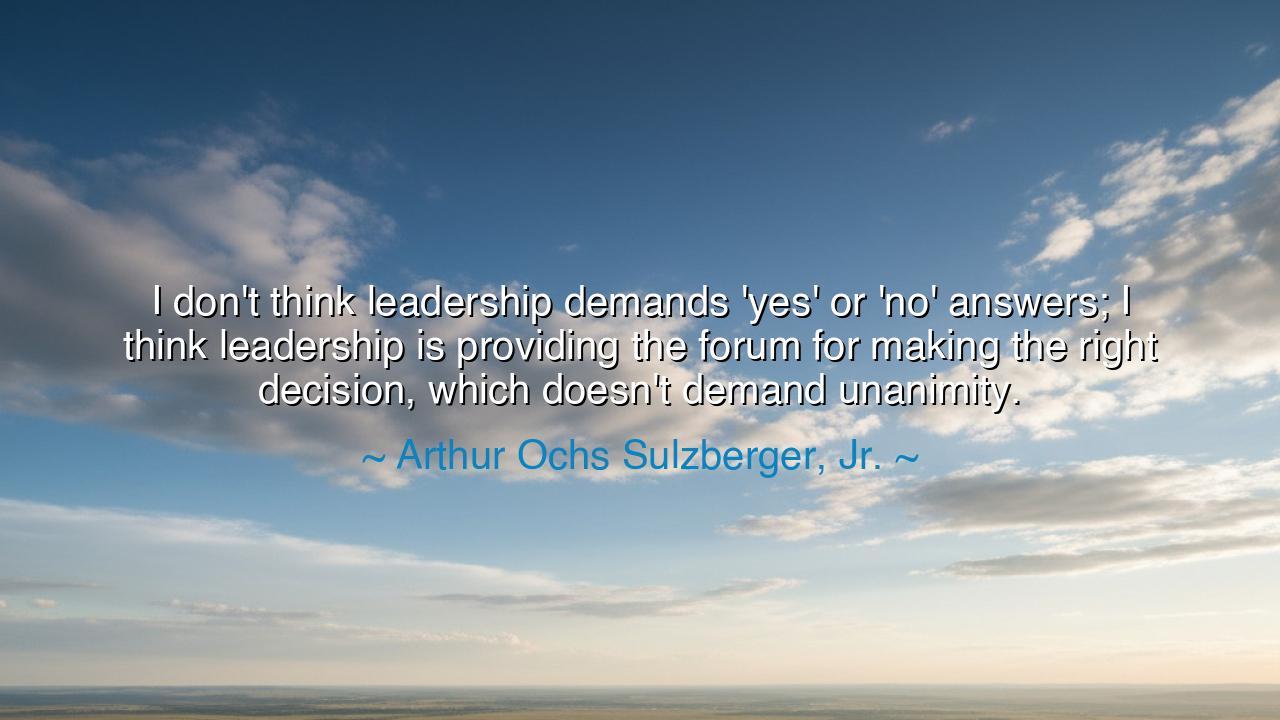
I don't think leadership demands 'yes' or 'no' answers; I think
I don't think leadership demands 'yes' or 'no' answers; I think leadership is providing the forum for making the right decision, which doesn't demand unanimity.






The words of Arthur Ochs Sulzberger, Jr. carry the gravity of one who has borne the burden of guiding others: “I don’t think leadership demands ‘yes’ or ‘no’ answers; I think leadership is providing the forum for making the right decision, which doesn’t demand unanimity.” In this, he reveals the essence of leadership not as tyranny, nor as mere authority, but as stewardship of dialogue. For true leadership is not the dictating of answers, nor the silencing of dissent, but the creation of a space where truth may emerge through the voices of many.
The ancients knew this wisdom well. In the councils of Athens, where democracy first breathed its fragile life, decisions were not always born from a single voice but from the clash and balance of many. Though the assembly was not perfect, it embodied this truth: that wisdom often lies not in “yes” or “no,” but in the careful weighing of perspectives. Leadership, then, is not the imposition of certainty but the cultivation of discernment, guiding people not toward unanimity, but toward justice.
Sulzberger, heir to the legacy of The New York Times, understood this in the realm of journalism as well as leadership. In an age when truth itself was contested, he recognized that to lead was not to silence debate but to provide the forum where ideas, facts, and arguments might contend until clarity emerged. In this sense, leadership is less about answers and more about questions—less about command and more about creating the conditions where the right decision can be discerned.
History gives us luminous examples. Consider Abraham Lincoln in his cabinet during the Civil War. He surrounded himself not with flatterers, but with rivals—men who often disagreed fiercely with him. Yet it was in the crucible of their arguments, in the forum of their debate, that Lincoln was able to refine his vision and guide the nation through its darkest trial. He did not demand unanimity, nor did he seek the false peace of silence. Instead, he welcomed dissent as a sharpening stone for truth. And in this, his leadership was made stronger.
The meaning of Sulzberger’s words is clear: leadership is not fragile; it does not fear disagreement. It recognizes that diversity of thought is not an obstacle but a resource. The leader who demands only “yes” or “no” creates slaves, not followers; but the leader who invites dialogue creates citizens, thinkers, and allies. Unanimity is not the measure of strength—integrity is. Truth does not always need every voice to agree, but it does need a space where every voice may be heard.
What, then, is the lesson for us? In our homes, our communities, our workplaces, we must not mistake silence for unity, nor compliance for harmony. To lead is to ask, to listen, to weigh, and then to act—not because all have agreed, but because the decision has been forged in the fire of honest deliberation. Let us not fear dissent, but welcome it, for it is often the companion of truth.
Practical wisdom follows: if you are called to lead, create forums where others may speak freely. Encourage debate, seek perspectives beyond your own, and resist the temptation to rush toward “yes” or “no.” When the decision must be made, make it with courage, not because everyone agrees, but because the process has been just. And if you are among the led, speak truth with humility, knowing that your voice may be the spark that illuminates the path.
Therefore, O seeker of wisdom, carry Sulzberger’s teaching in your heart: leadership is not the demand for answers, but the creation of space where truth can be revealed. Do not chase unanimity, for it is an illusion. Instead, chase wisdom, born of reason, dialogue, and courage. For in such leadership, both leaders and followers rise together—not as masters and servants, but as companions in the search for what is right.






AAdministratorAdministrator
Welcome, honored guests. Please leave a comment, we will respond soon